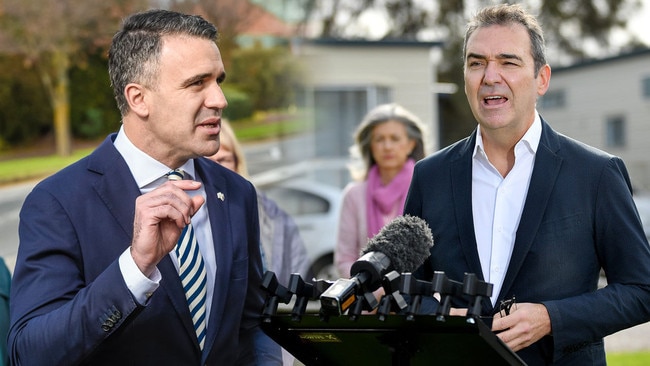Advertiser-YouGov poll: Premier Steven Marshall surges as preferred leader and Libs take the lead, as SA crushes the COVID curve
The coronavirus crisis has transformed everything, including Premier Steven Marshall’s political fortunes. See the exclusive poll results that will turn SA politics upside down.

SA News
Don't miss out on the headlines from SA News. Followed categories will be added to My News.
Premier Steven Marshall’s handling of the COVID crisis has dramatically boosted his own political fortunes, as the Liberals wrestle back a dominant election-winning poll lead.
An exclusive Advertiser-YouGov poll, to mark 18 months until the 2022 election, shows Mr Marshall has shrugged off perks scandals and outbreaks of Liberal division to take a commanding 53-47 lead over Labor.
He’s also surged to a breakaway preferred premier lead.
The result is a full reversal of the 53-47 lead Labor had six just months ago, at the half time point in the current electoral cycle, and follows SA’s success in crushing the COVID curve.
The Liberals also record a massive 46 per cent primary vote, a huge increase on the 38 per cent they scored in the drought-breaking election win of 2018.
Nosediving support for former senator Nick Xenophon’s SA Best and collapse of the Australian Conservatives has aided Mr Marshall, who would be poised to win an extra seat at an election held this weekend.
A draft redraw of SA electoral boundaries last month significantly shaved the Liberals’ advantage in several key marginal seats, giving Labor boosted hope of a historic victory.
However, today’s poll marks a 1.1 per cent overall swing to the Liberals since 2018.
That would be enough for all of Mr Marshall’s current MPs to be returned at an election and, if applied uniformly, the Liberals would also take the Fleurieu seat of Mawson from Labor.
Such a result would give the Liberals up to 26 seats, a clear majority of three in Parliament.
As preferred leader, Mr Marshall has surged to a daylight lead during the COVID crisis.
He is now the favoured choice of 54 per cent of SA, with Mr Malinauskas on 26 per cent.
Mr Malinauskas was narrowly behind Mr Marshall by 36-38 in March, a strong showing for a new opposition leader.
The number of people unable to pick between the two has fallen from 26 to 20 per cent in the COVID period, as each significantly lifts their public profile.
A strong 68 per cent of respondents are satisfied with Mr Marshall’s performance as premier. That includes 58 per cent of intending Labor voters.
A solid 44 per cent are happy with Mr Malinauskas’ performance.
However, a third of respondents say they don’t know enough about Mr Malinauskas to say how good a job he is doing. That suggests a struggle to effectively cut-through, but that he still has the capacity to convert supporters in a formal campaign.
Mr Malinauskas has been leader for just two and a half years, and in Parliament since 2015.
Labor’s primary vote is up 2.2 per cent since the 2018 election, to 35 per cent.
However, it has gone backwards from the 38 per cent result Opposition Leader Peter Malinauskas and his team scored in the March poll this year.
The Greens are polling 10 per cent, a significant improvement on the 6.7 per cent achieved at the 2018 election.
The political retirement of Mr Xenophon has trigged a fall for SA Best as a third force in state politics.
It achieved 14.1 per cent at the 2018 election, and is polling five per cent now.
The poll is of 810 respondents, with a 3.4 per cent plus or minus margin for error.
It was taken between Thursday last week and Wednesday this week.
That period included the fallout over Upper House President John Dawkins being booted from the party and chaotic scenes in Parliament, which were seen as damaging for the Government.
Labor has not won the popular vote at an SA election since 2006.
On the proposed draft boundaries released last month, Mr Malinauskas must win 50 per cent for a working majority.
Mr Marshall’s election strategy will likely focus on local campaigning to sandbag the seats he already has, several of which are held by first-term Liberal MPs.
